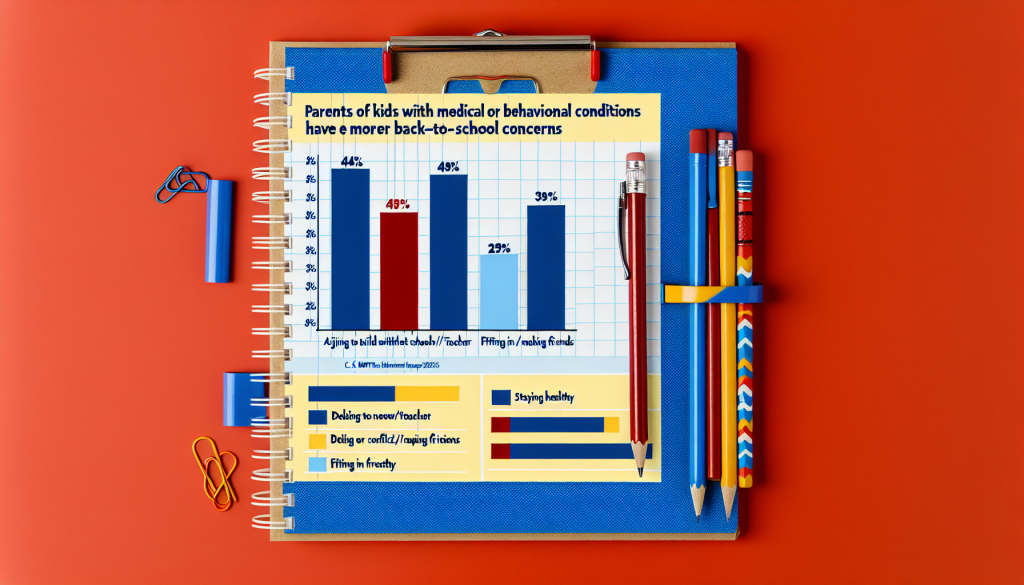Parents of kids with medical issues feel less assured about a successful school year

Image:
A recent national survey shows that parents of children with medical or behavioral health conditions are less assured in helping their child have a successful school year—and more likely to say their child feels anxious too.
Credit: Sara Schultz, University of Michigan
ANN ARBOR, Mich. – As fall approaches and students return to classrooms, many parents are experiencing a mix of emotions—especially when their children have specific health care needs.
Approximately one in four parents reported that their school-aged child has a health condition—either medical or behavioral—that might require additional support during the school day.
These parents are more commonly worried about how their child will adapt to new teachers or schools, handle peer issues, stay healthy, manage academic workload, and make social connections, according to the latest University of Michigan Health C.S. Mott Children’s Hospital National Poll on Children’s Health.
They also express lower confidence in their ability to help their children have a smooth school year, and more often notice their child feeling uncertain or nervous.
“Feeling uneasy at the beginning of the school year is completely understandable for parents, especially those navigating medical or behavioral challenges with their child,” said Dr. Susan Woolford, pediatrician and Co-Director of the Mott Poll.
“These families are thinking about more than just academics—they’re considering safety, inclusion, and whether educators understand and are prepared to meet their child’s health needs.”
The poll gathered responses from 1,101 parents of children aged 6 to 12 and was conducted in August.
Understanding School-Related Needs for Kids with Health Challenges
Health concerns vary widely and can include ongoing conditions like asthma, epilepsy, or food allergies—all of which typically require emergency action plans. Others may include behavioral or developmental issues like ADHD, anxiety, autism spectrum disorder, or depression, which influence classroom interaction and peer relationships.
Parents of children with these conditions often say their child needs special school arrangements, medical support during the day, flexible attendance policies, emergency guidelines, or restrictions on food and physical activity.
Over half of these parents said they’ve had meetings with educators or school personnel to develop plans for accommodations. Around half reported having formal arrangements with the school, though fewer had written instructions from healthcare professionals or submitted emergency plans.
“Strong communication between families and the school at the beginning of the year is essential to ensure children with medical requirements are not left behind,” said Woolford.
“Collaborative planning among parents, teachers, school health staff, and medical providers helps to support a safer and more successful school experience for the child.”
Balancing Health Needs and Academic Expectations
Managing health isn’t the only concern—for many families, missed classes due to appointments can also disrupt learning and social participation.
“Parents often serve as the bridge between the educational and medical teams, helping to coordinate strategies that keep their child academically engaged,” said Woolford.
In certain cases, this coordination may include applying for special education services or an Individualized Education Plan (IEP), which outlines the academic and social supports a child needs.
Even children who don’t qualify for special education services might be eligible for a 504 Plan, ensuring their learning environment is adjusted to meet individual needs. These adjustments can include changes to classroom placement or schedules, access to medications, staff training for emergencies, and safe conditions for physical activities.
Emotional Health and Social Struggles
While many children with health conditions are excited about going back to school, parents of these children less frequently describe them as confident.
To aid social integration, Woolford suggests using tools such as books that teachers can read aloud or parent-child presentations that gently explain the child’s condition to classmates and promote understanding.
“New classrooms mean new peers, and kids with health concerns might have a harder time with friendships or worry about being left out,” Woolford explained.
“These educational moments encourage inclusivity by showing that differences are normal and can be embraced with kindness and support.”
What Families Expect from Schools
Many parents in the survey expressed interest in school programs that would teach families ways to support their children—including handling conflict, safeguarding mental health, and managing the influence of social media.
Support for student mental health was especially important to parents of children with health issues—over 60% wanted schools to provide such resources, compared to less than half of parents whose children don’t face those difficulties.
Woolford says that schools offering mental health initiatives, along with programs focused on emotional development, can significantly enhance the school experience for all students—especially for those navigating extra challenges.
She advises parents to schedule early meetings with key school personnel such as teachers, nurses, and counselors to develop a unified plan tailored for their child’s needs. Regular parent-teacher meetings can also be opportunities for ongoing communication and support adjustments.
“Parents don't have to take this journey alone,” Woolford said.
“By building a strong partnership with their child’s school and involving healthcare providers, families can make sure their child feels secure, supported, and prepared for a successful academic year.”
